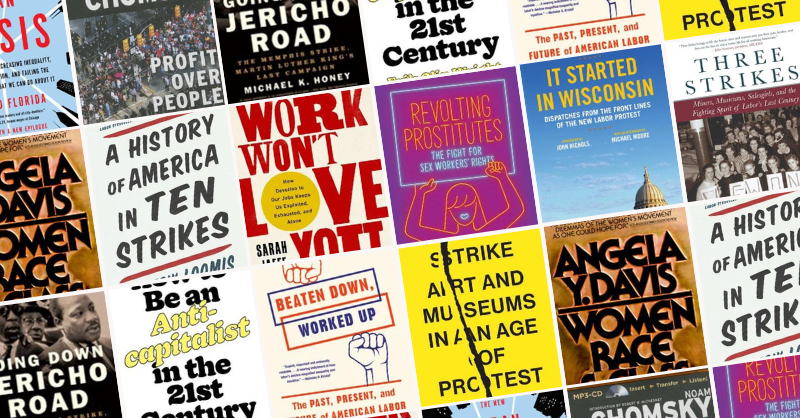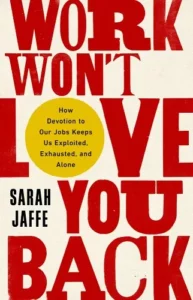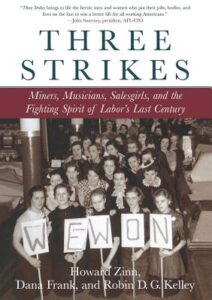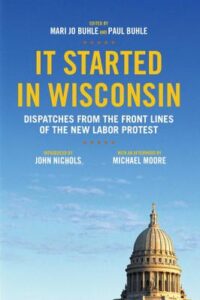With the SAG-AFTRA strike grinding all productions of our favorite films and tv shows to a halt I bet you’re looking for something to keep you brain occupied (and no watching The Office for the 50th time is no longer an option.) While you’re waiting for the hardworking people of Hollywood to get paid a living wage support them by reading a few books that are serving fuck capitalism.
Revolting Prostitutes: The Fight for Sex Workers’ Rights by Molly Smith and Juno Mac
How the law harms sex workers—and what they want instead
Do you have to endorse prostitution in order to support sex worker rights? Should clients be criminalized, and can the police deliver justice?
In Revolting Prostitutes, sex workers Juno Mac and Molly Smith bring a fresh perspective to questions that have long been contentious. Speaking from a growing global sex worker rights movement, and situating their argument firmly within wider questions of migration, work, feminism, and resistance to white supremacy, they make it clear that anyone committed to working towards justice and freedom should be in support of the sex worker rights movement.
In recent years, the young, educated, and affluent have surged back into cities, reversing decades of suburban flight and urban decline. And yet all is not well, Richard Florida argues in The New Urban Crisis. Florida, one of the first scholars to anticipate this back-to-the-city movement in his groundbreaking The Rise of the Creative Class, demonstrates how the same forces that power the growth of the world’s superstar cities also generate their vexing challenges: gentrification, unaffordability, segregation, and inequality. Meanwhile, many more cities still stagnate, and middle-class neighborhoods everywhere are disappearing. Our winner-take-all cities are just one manifestation of a profound crisis in today’s urbanized knowledge economy.
A bracingly original work of research and analysis, The New Urban Crisis offers a compelling diagnosis of our economic ills and a bold prescription for more inclusive cities capable of ensuring growth and prosperity for all.
Profit Over People: Neoliberalism & Global Order by Noam Chomsky
Why is the Atlantic slowly filling with crude petroleum, threatening a millions-of-years-old ecological balance? Why did traders at prominent banks take high-risk gambles with the money entrusted to them by hundreds of thousands of clients around the world, expanding and leveraging their investments to the point that failure led to a global financial crisis that left millions of people jobless and hundreds of cities economically devastated? Why would the world’s most powerful military spend ten years fighting an enemy that presents no direct threat to secure resources for corporations?
The culprit in all cases is neoliberal ideology—the belief in the supremacy of “free” markets to drive and govern human affairs. And in the years since the initial publication of Noam Chomsky’s Profit Over People: Neoliberalism and Global Order, the bitter vines of neoliberalism have only twisted themselves further into the world economy, obliterating the public’s voice in public affairs and substituting the bottom line in place of people’s basic obligation to care for one another as ends in themselves. In Profit Over People, Chomsky reveals the roots of the present crisis, tracing the history of neoliberalism through an incisive analysis of free trade agreements of the 1990s, the World Trade Organization, and the International Monetary Fund—and describes the movements of resistance to the increasing interference by the private sector in global affairs.
In the years since the initial publication of Profit Over People, the stakes have only risen. Now more than ever, Profit Over People is one of the key texts explaining how the crisis facing us operates—and how, through Chomsky’s analysis of resistance, we may find an escape from the closing net.
A deeply-reported examination of why “doing what you love” is a recipe for exploitation, creating a new tyranny of work in which we cheerily acquiesce to doing jobs that take over our lives.
You’re told that if you “do what you love, you’ll never work a day in your life.” Whether it’s working for “exposure” and “experience,” or enduring poor treatment in the name of “being part of the family,” all employees are pushed to make sacrifices for the privilege of being able to do what we love.
In Work Won’t Love You Back, Sarah Jaffe, a preeminent voice on labor, inequality, and social movements, examines this “labor of love” myth—the idea that certain work is not really work, and therefore should be done out of passion instead of pay. Told through the lives and experiences of workers in various industries—from the unpaid intern, to the overworked teacher, to the nonprofit worker and even the professional athlete—Jaffe reveals how all of us have been tricked into buying into a new tyranny of work.
As Jaffe argues, understanding the trap of the labor of love will empower us to work less and demand what our work is worth. And once freed from those binds, we can finally figure out what actually gives us joy, pleasure, and satisfaction.
How to Be an Anticapitalist in the Twenty-First Century by Erik Olin Wright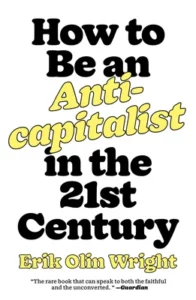
What is wrong with capitalism, and how can we change it?
Capitalism has transformed the world and increased our productivity, but at the cost of enormous human suffering. Our shared values—equality and fairness, democracy and freedom, community and solidarity—can provide both the basis for a critique of capitalism and help to guide us toward a socialist and democratic society.
Erik Olin Wright has distilled decades of work into this concise and tightly argued manifesto: analyzing the varieties of anticapitalism, assessing different strategic approaches, and laying the foundations for a society dedicated to human flourishing. How to Be an Anticapitalist in the Twenty-First Century is an urgent and powerful argument for socialism, and an unparalleled guide to help us get there. Another world is possible. Included is an afterword by the author’s close friend and collaborator Michael Burawoy.
Women, Race, & Class by Angela Y. Davis 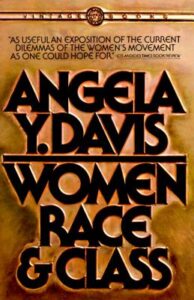
From one of our most important scholars and civil rights activist icon, a powerful study of the women’s liberation movement and the tangled knot of oppression facing Black women.
“Angela Davis is herself a woman of undeniable courage. She should be heard.”—The New York Times
Angela Davis provides a powerful history of the social and political influence of whiteness and elitism in feminism, from abolitionist days to the present, and demonstrates how the racist and classist biases of its leaders inevitably hampered any collective ambitions. While Black women were aided by some activists like Sarah and Angelina Grimke and the suffrage cause found unwavering support in Frederick Douglass, many women played on the fears of white supremacists for political gain rather than take an intersectional approach to liberation. Here, Davis not only contextualizes the legacy and pitfalls of civil and women’s rights activists, but also discusses Communist women, the murder of Emmitt Till, and Margaret Sanger’s racism. Davis shows readers how the inequalities between Black and white women influence the contemporary issues of rape, reproductive freedom, housework and child care in this bold and indispensable work.
Three renowned historians present stirring tales of labor: Howard Zinn tells the grim tale of the Ludlow Massacre, a drama of beleaguered immigrant workers, Mother Jones, and the politics of corporate power in the age of the robber barons. Dana Frank brings to light the little-known story of a successful sit-in conducted by the ‘counter girls’ at the Detroit Woolworth’s during the Great Depression. Robin D. G. Kelley’s story of a movie theater musicians’ strike in New York asks what defines work in times of changing technology.
Going Down Jericho Road: The Memphis Strike, Martin Luther King’s Last Campaign by Michael K. Honey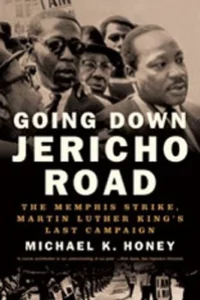
The definitive history of the epic struggle for economic justice that became Martin Luther King Jr.’s last crusade.
Memphis in 1968 was ruled by a paternalistic “plantation mentality” embodied in its good-old-boy mayor, Henry Loeb. Wretched conditions, abusive white supervisors, poor education, and low wages locked most black workers into poverty. Then two sanitation workers were chewed up like garbage in the back of a faulty truck, igniting a public employee strike that brought to a boil long-simmering issues of racial injustice.
With novelistic drama and rich scholarly detail, Michael Honey brings to life the magnetic characters who clashed on the Memphis battlefield: stalwart black workers; fiery black ministers; volatile, young, black-power advocates; idealistic organizers and tough-talking unionists; the first black members of the Memphis city council; the white upper crust who sought to prevent change or conflagration; and, finally, the magisterial Martin Luther King Jr., undertaking a Poor People’s Campaign at the crossroads of his life, vilified as a subversive, hounded by the FBI, and seeing in the working poor of Memphis his hopes for a better America.
In the spring of 2011, Wisconsinites took to the streets in what became the largest and liveliest labor demonstrations in modern American history. Protesters in the Middle East sent greetings—and pizzas—to the thousands occupying the Capitol building in Madison, and 150,000 demonstrators converged on the city.
In a year that has seen a revival of protest in America, here is a riveting account of the first great wave of grassroots resistance to the corporate restructuring of the Great Recession.
It Started in Wisconsin includes eyewitness reports by striking teachers, students, and others (such as Wisconsin-born musician Tom Morello), as well as essays explaining Wisconsin’s progressive legacy by acclaimed historians. The book lays bare the national corporate campaign that crafted Wisconsin’s anti-union legislation and similar laws across the country, and it conveys the infectious esprit de corps that pervaded the protests with original pictures and comics.
A History of America in Ten Strikes by Erik Loomis
Powerful and accessible, A History of America in Ten Strikes challenges all of our contemporary assumptions around labor, unions, and American workers. In this brilliant book, labor historian Erik Loomis recounts ten critical workers’ strikes in American labor history that everyone needs to know about (and then provides an annotated list of the 150 most important moments in American labor history in the appendix). From the Lowell Mill Girls strike in the 1830s to Justice for Janitors in 1990, these labor uprisings do not just reflect the times in which they occurred, but speak directly to the present moment.
For example, we often think that Lincoln ended slavery by proclaiming the slaves emancipated, but Loomis shows that they freed themselves during the Civil War by simply withdrawing their labor. He shows how the hopes and aspirations of a generation were made into demands at a GM plant in Lordstown in 1972. And he takes us to the forests of the Pacific Northwest in the early nineteenth century where the radical organizers known as the Wobblies made their biggest inroads against the power of bosses. But there were also moments when the movement was crushed by corporations and the government; Loomis helps us understand the present perilous condition of American workers and draws lessons from both the victories and defeats of the past.
In crystalline narratives, labor historian Erik Loomis lifts the curtain on workers’ struggles, giving us a fresh perspective on American history from the boots up.
Strikes include:
- Lowell Mill Girls Strike (Massachusetts, 1830–40)
- Slaves on Strike (The Confederacy, 1861–65)
- The Eight-Hour Day Strikes (Chicago, 1886)
- The Anthracite Strike (Pennsylvania, 1902)
- The Bread and Roses Strike (Massachusetts, 1912)
- The Flint Sit-Down Strike (Michigan, 1937)
- The Oakland General Strike (California, 1946)
- Lordstown (Ohio, 1972)
- Air Traffic Controllers (1981)
- Justice for Janitors (Los Angeles, 1990)
Culture Strike: Art and Museums in an Age of Protest by Laura Raicovich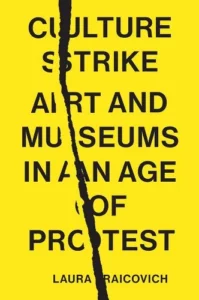
A leading activist museum director explains why museums are at the center of a political storm
In an age of protest, cultural institutions have come under fire. Protestors have mobilized against sources of museum funding, as happened at the Metropolitan Museum, and against board appointments, forcing tear gas manufacturer Warren Kanders to resign at the Whitney. That is to say nothing of demonstrations against exhibitions and artworks. Protests have roiled institutions across the world, from the Abu Dhabi Guggenheim to the Akron Art Museum. A popular expectation has grown that galleries and museums should work for social change.
As Director of the Queens Museum, Laura Raicovich helped turn that New York muni- cipal institution into a public commons for art and activism, organizing high-powered exhibitions that doubled as political protests. Then in January 2018, she resigned, after a dispute with the Queens Museum board and city officials. This public controversy followed the museum’s responses to Donald Trump’s election, including her objections to the Israeli government using the museum for an event featuring Vice President Mike Pence.
In this lucid and accessible book, Raicovich examines some of the key museum flashpoints and provides historical context for the current controversies. She shows how art museums arose as colonial institutions bearing an ideology of neutrality that masks their role in upholding conservative, capitalist values. And she suggests ways museums can be reinvented to serve better, public ends.
Beaten Down, Worked Up: The Past, Present, and Future of American Labor by Steven Greenhouse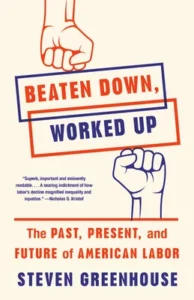
We live in an era of soaring corporate profits and anemic wage gains, one in which low-paid jobs and blighted blue-collar communities have become a common feature of our nation’s landscape. Behind these trends lies a little-discussed problem: the decades-long decline in worker power.
Award-winning journalist and author Steven Greenhouse guides us through the key episodes and trends in history that are essential to understanding some of our nation’s most pressing problems, including increased income inequality, declining social mobility, and the concentration of political power in the hands of the wealthy few. He exposes the modern labor landscape with the stories of dozens of American workers, from GM employees to Uber drivers to underpaid schoolteachers. Their fight to take power back is crucial for America’s future, and Greenhouse proposes concrete, feasible ways in which workers’ collective power can be—and is being—rekindled and reimagined in the twenty-first century.
Beaten Down, Worked Up is a stirring and essential look at labor in America, poised as it is between the tumultuous struggles of the past and the vital, hopeful struggles ahead.

A literary omnivore and influential Bookstagrammer, Layne applies her vivid creativity for every title we promote by deftly coordinating news coverage and events for authors, writing and editing diverse content for social media, and assisting with Books Forward’s social media engagement initiatives.
As a former special education teacher, Layne firmly believes in the importance of literature and accessibility. This unique point of view is an asset in her publicity efforts as she works to reach readers across various platforms and demographics.
Layne received her Bachelors of Arts in Creative Writing and Bachelors of Science in Psychology from Virginia Polytechnic Institute and State University, and her Masters of Art in Teaching from Relay Graduate School of Education. She lives in New Orleans with her loyal, but sadly illiterate cat, Macaroni.
